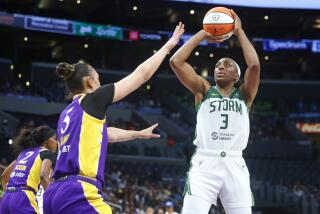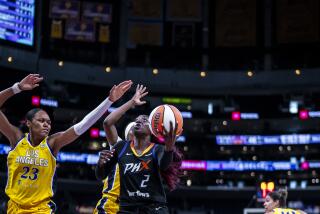ON PINS & NEEDLES : With Its Hex in First Round of Playoffs Finally Broken, a 2-0 Lead Over Rockets, Seattle Aims for Bigger Game
A funny thing happened on the way to this year’s choke.
If it’s the first round of the NBA playoffs, the Seattle SuperSonics must be in trouble and there they are, in Sacramento, tied, 1-1 with the lowly Kings, losing in the fourth quarter of Game 3 before 17,000 howling, towel-brandishing fans.
SuperSonic star Shawn Kemp has just drawn his fifth personal, trying to knock the ball out of Olden Polynice’s hands at mid-court. If they made highlight films of stupid fouls, Kemp could retire and live off the residuals.
At 26, Kemp is still keeping maturity at bay, having started the series with a league-imposed suspension for fighting in the last game of the season, another Phi Beta Kappa move. If he reads the papers, he might have noticed the story after Game 1--an impressive victory--in which an unidentified teammate said the SuperSonics had played smarter without their star.
Asked if that’s a general rule, the player answered, “You can read between the lines, can’t you?”
If Kemp watches TV, he knows who the teammate is too, since the interview with Sam Perkins was also on TNT.
As if to prove Perkins’ point, Kemp then returns for the Game 2 loss in which you can almost see SuperSonic hearts shrinking to the size of peas as the specter of another summary dismissal rises in the night.
After that, the team is a smoldering ruin. Elder statesman Nate McMillan calls it the capper, worse than the losses to the Denver Nuggets or Lakers in ’94 and ’95.
“That was the worst for me,” he says, “because of what we had been through, what was on the line, what we were trying to do and the effort we gave. I couldn’t talk to anybody. I walked around for two days and just--guys just knew I was going crazy. I had a lot to say but nothing would come out.”
With 5:49 left in Game 3, Tyus Edney makes a three-point shot, putting the Kings up by eight. Kemp is on the bench with a towel over his head, wondering how he gets into these messes, as is Coach George Karl, the one-time enfant terrible, who turned a mediocre team into the NBA’s winningest overnight--239 victories in four seasons, eight more than the Chicago Bulls--and hears annually that he’s going to be fired, wants to leave, or both.
Karl is as emotional as his high-strung colts, though he has a better idea of the consequences, having served an exile coaching in Spain after a turbulent early career, marked by such acts as cleaning out Joe Barry Carroll’s locker at Golden State. Karl still has the highest ups and the lowest downs. Another SuperSonic--not Perkins--confides to a Seattle reporter that George is so jacked up now, his voice is so squeaky only dogs can hear him.
Anywhere else, they would call this an upset in the making.
In Seattle, they just call it spring.
Maybe things are changing? The SuperSonics win Game 3, catching up on key three-point shots by Perkins and Frank Brickowski. Then they win Game 4. For the first time in three years, they’re in the second round.
“You can’t talk about it,” says Karl afterward as relief courses through his body and the franchise.
“It’s a misery you don’t want to put on anybody. I know after we lost to Sacramento, my 12-year-old kid was emotionally broken and scared. So it filtered all the way down to my son, the pressure of what we just got done with.
“You can sit there and say you’re doing a first-class job and you’re proud of the record that we have, but it’s hard. It’s hard when the respect and the support isn’t there sometimes. You can say that this team deserves much better, but the mentality of the game won’t give it to you. . . .
“It’s not that important, either, because the team in that locker room, I believe, won tonight’s game for themselves and for those 20 people in that locker room, who know what’s really going on.”
In that locker room, Perkins is talking to reporters with Gary Payton listening in. Payton, 27, is a six-year veteran but still struts and banters like a playground warrior from Oakland, which he is.
“We didn’t want to draw this series out,” Perkins tells the press.
“Yeah, all right,” croons Payton, needling him. “Yeah, all right.”
“I’m using my vocabulary, so listen,” says Perkins.
In reply, Payton curses.
“No,” says Perkins, “not that word. . . . You should listen. I’m not saying ‘You know, you know, you know.’ I use every word properly.”
“You’re 88,” says Payton, “You should be.”
Before the pivotal Game 3, Payton had had a cursing match with another Seattle reporter, who was asking about the player’s flu during Game 2.
That’s what goes on in that locker room. They don’t make them like Payton, Kemp and the SuperSonics any more, for which many coaches are thankful.
*
The biggest misconception about the SuperSonics is that they’re a young team.
They’re actually hoary with age--Perkins, Brickowski, McMillan, Detlef Schrempf, Hersey Hawkins and Vince Askew will all be 30 by next season--with two young stars, Kemp and Payton.
Perkins, joining the team during the 1992-93 season, was astonished to find a team so successful and volatile. He had been to the NBA finals with a Laker team led by Magic Johnson and James Worthy, where roles were defined and order reigned. In comparison, the SuperSonics were like an ant colony.
“I saw the personality of this crew,” Perkins says. “There was no one except Nate taking everything upon his shoulders.
“I felt that coming in after all these years, I should speak up. I saw myself as a veteran. . . . That first half-season was an experience. . . .
“You had players who wanted to be more than what their role was. There were a lot of misunderstandings, a lot of cursing, a lot of yelling. It wasn’t cohesive like it was in L.A. Like you knew Magic would post. You didn’t know who would shoot the ball here. You had a lot of adversity here before you went out on the court, which made everything more complicated.”
Complicated or not, the SuperSonics were on the way up, reaching the West finals before falling to the Phoenix Suns, 4-3.
The next spring, disaster hit. After winning 63 games--five more than anyone else--they were stunned in the first round by the Nuggets.
The next spring, disaster hit again. The Lakers took them out in four games.
“That’s the thing that was so upsetting,” says McMillan. “You knew you had a great ballclub and you end up like you did.
“Just the way it happened, things that were said--people don’t understand. Teams played well against us in the playoffs. You’re looking at Olden Polynice and what he did this series. You look at what Brian Williams did for Denver and Robert Pack and LaPhonso Ellis did. And what [Nick] Van Exel did. Van Exel shot 20-something percent this series against Houston. He probably shot 60 against us. This year was no different, Mitch [Richmond] came back and had a great game against us--37--and we tried everything.
“People don’t understand, our key guys are 25, 26 years old and they’re supposed to understand what it takes, mentally and physically, to get to the finals. People weren’t giving us credit for that.
“We’ve got young guys who we’re giving the ball to, who are making decisions--you know, they’re trying to have fun and earn money and all of a sudden they’ve got the burden of a Magic Johnson or a Larry Bird.”
Kemp is a rare combination of quickness and power with corkscrew moves opponents can barely follow, much less defend against. Payton is a force at both ends of the floor and, for all his trash talking, was named NBA Defensive Player of the Year on Monday. They are less prone to the kind of play that occurred in a 1995 game in the Forum in which Payton, going in on a fastbreak, lobbed the ball off the backboard to Kemp for a dunk, which Shawn missed, in a one-point Laker win.
Nevertheless, it’s a slow process that isn’t enhanced by the scrutiny that comes with fame and riches.
Kemp was criticized for his performance at the 1994 World Cup in Toronto, where he celebrated his dunks with primal screams and grabbed his crotch. Bent on making the Olympic team, he had his best season--until the selection committee left him off. After the April 11 announcement, Kemp, who had averaged 20 points, dropped to 14, missed a flight and got into the fight with Denver’s Tom Hammonds that got him suspended for the playoff opener.
“There is less bitching for sure,” Perkins says. “I guarantee you that. There’s more concentrated effort. There’s guys not fighting for the ball.
“All those little negative things that happened two years ago went away, slowly but surely. And you’re going to have that every now and then but it’s so minimal now that it’s like, you come to the gym now, you can breathe. You can exhale.”
At least for another week or two. Not many teams would regard a second-round matchup with the twice-defending NBA champions as a relief, but the SuperSonics went in with glee and blew out the Rockets by 33 points in Game 1.
Game 2 was closer, but the SuperSonics won again, 105-101.
They have now won their last 11 games against the Rockets. If they win two more this spring, get ready for the bandwagon jump-on of all time.
At any rate, they’re feeling better about themselves than they did a week ago.
“We had a huge gorilla back there,” said Schrempf. “Now, maybe it’s a small ape.”
(BEGIN TEXT OF INFOBOX / INFOGRAPHIC)
Sonic Boom to Bust
Seattle has the best regular - season record in the NBA over the last four seasons, but it doesn’t have much to show for it during the playoffs. Will 1996 be different? The Sonics have already advanced past the first round for the first time in three years.
*--*
Team Reg. Sea. Playoff Seattle 239-89 17-20 Chicago 231-97 41-20 San Antonio 225-103 15-17 New York 219-109 35-28 Phoenix 218-110 29-23 Utah 215-113 21-21 Houston 208-120 36-21 Orlando 208-120 11-13
*--*
More to Read
Go beyond the scoreboard
Get the latest on L.A.'s teams in the daily Sports Report newsletter.
You may occasionally receive promotional content from the Los Angeles Times.










